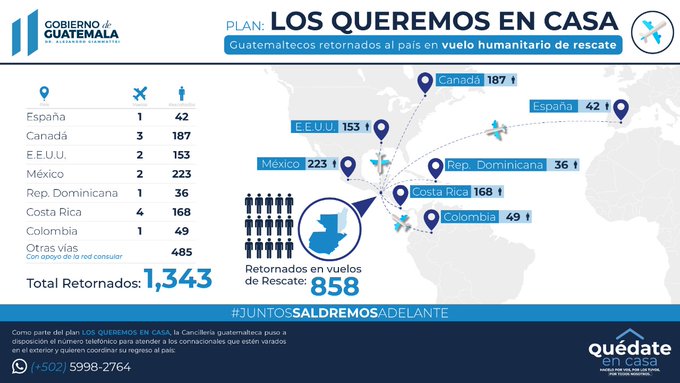Los varados -- the stranded ones
As a US citizen registered with the US embassy in EL Salvador, I received an email this evening which informed me that:
As of April 14, the U.S. Embassy in El Salvador has assisted 3,792 U.S. citizens and Lawful Permanent Residents to return to the United States through humanitarian and evacuation flights. Two additional humanitarian flights with an estimated 358 passengers are scheduled through April 19.
Persons returning to the US from El Salvador are not subject to any particular quarantine procedure and are free to return to their homes.
The same cannot be said for Salvadorans abroad who are trying to return to El Salvador. Since March 18, El Salvador's airport has been closed to international passenger flights even if they are only carrying Salvadoran citizens. The airport was closed via a tweet by president Bukele with only a few hours warning. By one count, published by El Diario de Hoy, the closure has left 3450 Salvadorans stranded around the world, trying to get home. They are "los varados" -- the stranded ones.
Los varados include Salvadorans studying abroad, participating in international conferences, visiting relatives, attending film festivals, and people wanting to return from abroad to care for relatives in El Salvador. Yet El Salvador has so far not taken steps to evacuate its citizens stranded in other countries back home, out of fear that they might bring the virus with them. In fact, on March 25, the foreign ministry issued a statement urging Salvadorans not to return home to infect their country.
For many of those stranded, this poses a real financial challenge. Especially if you were only travelling with clothes for two weeks and the money to support yourself for that time, you have needed to find a way to pay for food and lodging for four weeks with still no end end in sight.
This closed door policy of El Salvador stands in contrast to Guatemala which has been operating humanitarian flights flying citizens back to that country under the slogan "los queremos en casa" -- "we want you home."

In response to the plight of stranded Salvadorans, the Constitutional Chamber issued a ruling on April 8, that the government develop a plan for their return. According to the the Chamber, the plan should prioritize the return of those with greatest vulnerability, the elderly and those with medical conditions, or parents with minor children back in El Salvador. Everyone returning will be subject to such quarantine conditions as the health ministry deems necessary. That could mean 30 days in a quarantine center.
The Chamber also required the government to develop a database of those who are stranded. To that end, the Foreign Ministry has asked Salvadorans who are stranded around the world to fill out a form so that they can receive assistance.
The Secretary of Communications today tweeted out a picture of a quarantine center dormitory being prepared for persons returned to the country. Meanwhile the Foreign Ministry's twitter feed has been filled with images of bags of food being delivered to stranded families around the globe.
As of today, however, no actual plan to bring los varados home has been announced by the Salvadoran government in compliance with the ruling of the Constitutional Chamber. In addition, there appears to be no help at all for persons who have residency in El Salvador but are not Salvadoran citizens.
It is also likely that if Salvadorans get the chance to finally return home that we will see more deportation flights from the US will arrive as well. President Trump's threat to stop visa issuance for countries which did not receive deportees during the pandemic was widely reported in El Salvador. It was followed yesterday by Secretary of State Mike Pompeo tweeting that the US was going to continue foreign assistance to El Salvador for its fight to prevent illegal immigration and Foreign Minister Hill responding "it is only by supporting each other that we will succeed."
Meanwhile, although only 6 people have perished from COVID-19 within El Salvador, 59 Salvadorans in the diaspora around the world have succumbed to the disease to date.



Comments